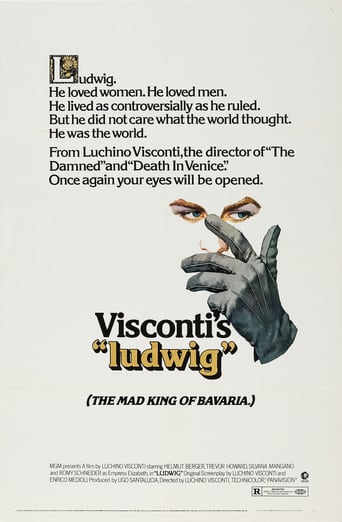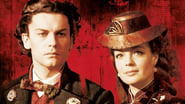t_atzmueller
"I would like to remain an enigma; to myself and to others", is one of the most memorable (and cryptic) remarks of Ludwig II, the last king of Bavaria. Whether intentional or not, director Visconti seems to have honored the wish of the tragic monarch. Rather than analyzing the person Ludwig, Visconti focuses almost entirely on Ludwig being a neurotic being, alienated from the real world, living in his own fantasy-land of music and mythology, a classic closet-gay, whose entire existence is overruled by his suppressed sexuality.Arguably there has been much more to the historic Ludwig, which was a very complex human. However, this doesn't make "Ludwig" a bad movie.The movie is carried by Helmut Berger who proved with "Ludwig" that is wasn't only a mere pretty face and the toy of homosexual filmmakers, but that he could actually act formidably (and it's rather sad that his carrier declined rather steep after "Ludwig", coming to a point where he only haunted the tabloids with drunken antics, today a mere wreck and definition of a shadow). Equally strong are actors Trevor Howard as the manipulative Richard Wagner and Romy Schneider, who played Sissy, empress of Austria, for the fourth time and finally got to play the character as a real human-being, far off the schmaltzy persona of the Ernst Marischka trilogy.Further points go to the exquisite cinematography and having filmed on the authentic locations ("Ludwig" was among the last films that was permitted to be filmed in Ludwig's castles, which remain among the most visited tourist-attractions in Bavaria, perhaps with the exception of the "Oktoberfest"). Though Visconti obviously has an eye for the aesthetic beauties of the locations, he manages to build up an almost claustrophobic atmosphere which underlines that Ludwig, despite the splendor and grandeur, essentially built himself a golden cage.On the downside are the other supporting actors, which were apparently all chosen on their physical merits, not acting ability. Yes, we all knew that Lucino Visconti was prone to handsome males, but seeing this parade of handsome youths, one almost gets the idea that Visconti cast this crew in his hotel room.In short: "Ludwig" is often overlong, a tad too colorful and occasionally even boring, but it captures the essence of the time. If you're into overlong, colorful epics that can fill an evening, "Ludwig" is highly recommendable.A word of warning and a recommendation: After watching "Ludwig", I'd avoid the 1993 movie "Ludwig 1881", which again stars Helmut Berger in the title role. While generally not a bad film, it pains to see the almost 50-year old Berger reprising his role as (supposedly) youthful king. On the other hand, if one wishes to delve further into the story of King Ludwig, I can only recommend Hans-Juergen Syberbergs 1972 film "Th. Hierneis oder: wie man ehem. Hofkoch wird". It has likewise been filmed on location and despite being a one-man-show of Walter Sedelmayr as Ludwigs former kitchen-aid-cum-master-cook, it does offer many insights into the psyche of the "Fairy-Tale-King" Ludwig.I'd give it a dashing 8/10
vitaleralphlouis
Based only on the first half of this film (divided into 2 DVD's) I'd rate the film 9 out of 10. The film brings into focus how Ludwig falls forever in love with Sissi, the Queen of Austria; a girl clearly out of his reach but who ties him into knots with her beauty and personality. Romy Schneider returns from the 3 Sissi movies agreeing to play the part only if she could play it with honesty, including all her disillusion with her marriage as well as being queen. Ludwig realizes Sissi has caught on to his flaws, that he's a very insecure man who clings to better people to create an aura of stature. His ill-fated solution is to propose marriage to Sissi's sister, Sophie; if you can't get the one you love then grab up her sister. Truly heartbreaking, even for royalty and all their power.All this is destroyed in Part Two wherein Visconti fabricates a homosexual theme, putting it into graphic terms. In 1972, this was supposed to be daring and brave filmmaking. This theme negates the unrequited love theme we've just spend two hours on. The important thing is that history does not show any hard evidence of Ludwig being homosexual. Because he was lonely from the loss of his true love, and backed away from marrying the sister, he's given a bum rap; here sensationalized by a cinema hack.
Rindiana
So much could have gone wrong with this follow-up to Visconti's deeply flawed "Morte a Venezia": the treatment of Ludwig II's (dream-)life could have resulted in hokey mystification; Helmut Berger's impersonation could have been badly influenced by the actor's frequently mannered performances; re-casting Romy Schneider as Sissi could have been a mere folly; and stretching the running-time to four hours could have been the nail in the coffin.But miraculously, it all works: Visconti's elegant and empathic direction finds the right biographical tone; Berger has never been better; Romy is simply dazzlingly charming and witty in her second, much more mature approach to the Sissi character; and (except for the bumpy last hour) there's not a single unwanted scene.Plus, Trevor Howard's Richard Wagner is a real treat; the other supporting actors are uniformly excellent; Ludwig's dormant homosexuality is subtly handled; the soundtrack is a marvel and visually, it's Visconti's most impressive work.9 out of 10 moonlit horse rides
alexx668
In this last part of his German trilogy, Visconti delves the most into the human psyche, and in particular it's contradictory forces within. On one hand the self-destructive urge for physical pleasure, on the other the spiritual search for the sublime. The Dionysean and the Apollonian. Body and soul.Ludwig II, aka the "mad" king of Bavaria, is dragged to the limits by these two opposite forces. Losing focus on a vulgar reality, he surrenders to sexual perversion and yet also to a search for artistic purity, eventually leading him to madness, and finally to death. Trying in vein to find the sublime and eternal kingdom of the literary heroes he craves for, his behavior becomes more and more erratic until he is violently dethroned (a recurring theme in Visconti's work: the fall of aristocracy and the rise of bourgeois democracy).Visconti directs this paradox with a highly elegant style, influenced by the romanticism of painters like Caspar David Friedrich and Frederic Edwin Church. The movie reaches a climax at around the third hour, when Ludwig and his protégé Joseph Kainz travel together through the endless frozen night, so that Ludwig shows Kainz his "real kingdom, the mountains under the moonlight, a world for ourselves, pure and uncontaminated". "Think about your soul, not about your body" Ludwig tells him. This a last hurrah. After Kainz's rejection, Ludwig declines further in decay and resignation.The events depicting the conspiracy that dethrones him are grotesquely-staged and almost out of sync, emphasizing Ludwig's confusion and ill mental-state. Knowing his downfall is near, he confesses to one of the staff how he believes in the immortality of the soul and God's justice. "I've read many things about materialism", he says, "but it will never satisfy a man, cause he doesn't want to be put in the same level as beasts". That's a rare confession for Visconti.After he is captured, the film once again alters in style, to a kind of austere chamber-cinema with a funereal feel. Near the end (and his death), Ludwig says to psychiatrist professor Gudden: "There is nothing more beautiful and fascinating than the night. They say the cult of the night, of the moon, is a maternal cult. The cult of sun, of daytime, is a masculine myth, therefore paternal. However the mystery, the greatness of night, for me lie in the infinite sublime kingdom of the heroes, which is also the kingdom of reason. Poor Dr. Gudden, you are forced to study me from dawn to dusk and from dusk to dawn. But I am an enigma, and I want to be an enigma forever, for the world and for myself".Just like man. Sublime.






